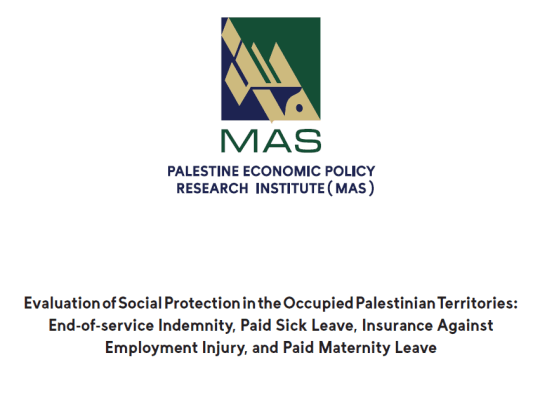Evaluation of Social Protection in the Occupied Palestinian Territories: End-of-service Indemnity, Paid Sick Leave, Insurance Against Employment Injury, and Paid Maternity Leave
This study was commissioned by the International Labour Organization (ILO) to contribute to the ongoing dialogue on social security reforms following the First National Conference on Social Dialogue held in March 2021. The conference recommended a review of the main provisions of the suspended law, particularly those related to the replacement of certain regulations, which govern the responsibilities and obligations of employers under the Labour Law, including end-of-service indemnity/severance payment, employment injury, paid maternity leave, and paid sick leave. The aim of the study is to examine the effectiveness and accessibility of social protection entitlements that employers are required to provide under the current Labour Law (Law No. 7 of 2000). Additionally, the study seeks to evaluate the perceptions of employers, workers, and the general public regarding social protection and the decision to enact the Suspended Social Security Law No. 19 of 2016 in Palestine. Drawing on the results of a field survey conducted by MAS Institute in collaboration with the Palestinian Central Bureau of Statistics (PCBS) in Palestine, the study explores the potential for reform and improvement of social security as an alternative means of financing and managing necessary protection systems to secure the risks identified in the current Labour Law.
The study has concluded that the inspection activities conducted by the Ministry of Labor (MoL) cannot be characterized by optimal efficiency, and the penalties imposed by labor law do not effectively deter non-compliant employers or ensure full and comprehensive access to social protection benefits. Additionally, burdening employers with the responsibility and associated costs of providing social protection places a heavy burden on them, and many are expected to resist compliance. Furthermore, the Palestinian judicial system lacks specialized labor courts for resolving disputes, further hindering workers› access to legal and social protection. To address these issues, it is advisable to resume dialogue and negotiation between the parties involved within the labor system to replace the provisions of labor law related to social protection with a social security system.
We would like to express our gratitude to the research team at the institute, led by Dr. Belal Fallah, and to the ILO and its office in Palestine for providing the opportunity to conduct this study and for providing the necessary facilities during the study›s implementation phase, as well as for their informative insights. We also extend our deep appreciation to PCBS for their significant efforts in collecting quantitative data and completing it within the specified timeframe. Lastly, we thank everyone who contributed to providing support and active participation in terms of time and effort during the implementation and preparation of this study.

